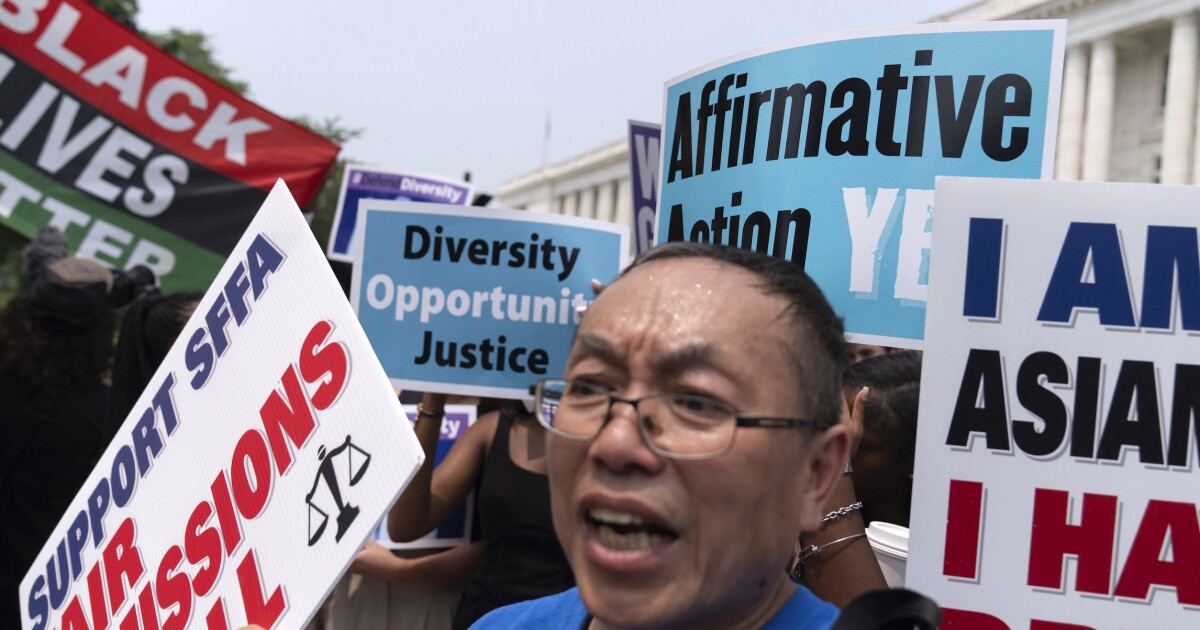

The Biden administration rolled out a list of suggestions this week for colleges to embrace diversity, indicating it plans to keep pushing the matter in 2024.
One of the Supreme Court‘s most significant rulings last term ended affirmative action at most colleges, a decision President Joe Biden and Democrats lamented. But the administration said that’s not the end of the story for diversity initiatives in higher education.
UP FOR DEBATE: WHERE TRUMP, DESANTIS, AND REST OF REPUBLICAN 2024 FIELD STAND ON KEY ISSUES
“This moment demands the same courageous commitment to equal opportunity and justice we saw from leaders at the height of the civil rights movement,” Education Secretary Miguel Cardona said on a call with reporters, noting his own status as the grandson of a sugarcane farmer in Puerto Rico.
A new set of guidelines jointly issued by the Department of Justice and the Department of Education encourages colleges to promote diversity through other means, such as recruiting from high schools with a high percentage of minority students and allowing applicants to discuss how race affected them as individuals.
The guidelines included examples of how students could discuss race in their admissions essays, such as an applicant who became the first black violinist in their city youth orchestra or a student who overcame the challenge of being the only person of South Asian descent at a rural high school.
However, the document explicitly notes it does not carry the force of law.
The guidelines instead are billed as resources for colleges and universities to “understand the U.S. Supreme Court’s decision in Students for Fair Admissions, Inc. v. President and Fellows of Harvard College and Students for Fair Admissions, Inc. v. University of North Carolina,” two cases in which the court ruled that race considerations in admissions violated the Civil Rights Act of 1964.
“This is a moment of great urgency in higher education,” Cardona said. “The Supreme Court’s decision to end affirmative action has taken away a tool that colleges have used for decades to build diverse campus communities and create equitable opportunities for students of all backgrounds.”
Cardona also noted that fewer minority students applied and were admitted to colleges in states that banned affirmative action at that level of government, something he described as backsliding that would be damaging to the nation.
It’s likely to become an issue in the 2024 campaign as the White House attempts to court voters who support race-based admissions preferences.
A Pew Research Center poll from June found that a majority of respondents disapprove of colleges considering race and ethnicity in admissions decisions, with 50% disapproving, 33% approving, and 16% undecided.
However, among Democratic-leaning voters, there was strong support, with 54% approving and just 29% opposed. Black respondents also favored the policy by a margin of 47% to 29%, Hispanic voters were split, and whites and Asians were solidly opposed.
Conservatives argue the new guidance undermines the spirit of the Supreme Court ruling.
“In trying to chart a path through the SFFA decision, the administration ignores one of the most important parts of it: that the racial classifications that universities use are ‘imprecise in many ways’ and undermine instead of promote true diversity,” said GianCarlo Canaparo, a senior legal fellow at the Heritage Foundation. “The administration is wrong to keep telling universities that using these arbitrary categories complies with the court’s decision.”
Another target is the practice of legacy admissions and admissions for the children of donors. Democrats, and some Republicans, say these practices are at least as discriminatory as affirmative action and help to uphold a permanent ruling class.
Sens. Ed Markey (D-MA) and Bernie Sanders (I-VT) sent a letter to the Department of Education on Tuesday calling for the end of donor and legacy admissions following the “far-right Supreme Court majority’s decision.”
“The court’s decision strikes a blow against diversity in higher education while keeping intact harmful practices that advantage the wealthy and well-connected,” the senators wrote.
CLICK HERE TO READ MORE FROM THE WASHINGTON EXAMINER
It’s a call that’s likely to be repeated on the 2024 campaign trail as affirmative action remains popular with Democratic voters, who also widely support Biden’s efforts to cancel student loans.
“We cannot let this decision be the last word,” Biden said after the Supreme Court handed down its decision. “I want to emphasize: We cannot let this decision be the last word.”






